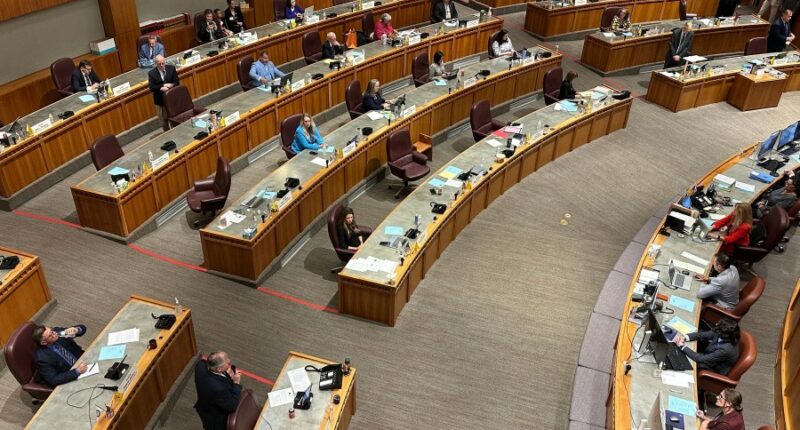Share this @internewscast.com

SANTA FE, N.M. (AP) — In response to President Donald Trump’s reductions in federal funding for Medicaid and nutrition programs, New Mexico legislators moved swiftly during a special session on Thursday to secure funding for food assistance and rural health care services.
The Democratic-majority Legislature forwarded a bill to Governor Michelle Lujan Grisham, allocating over $16 million to sustain the Supplemental Nutrition Assistance Program (SNAP) and enhance food bank support. This action comes as the federal government eliminates SNAP eligibility for many noncitizens and alters benefit calculations for others.
“We must act to ensure that New Mexicans do not experience food insecurity due to federal-level SNAP changes,” stated Democratic state Senator George Muñoz from Gallup.
Another $50 million would help sustain medical services at rural health clinics and hospitals that rely heavily on Medicaid spending.
Republicans, part of the legislative minority, unanimously opposed the spending measures, insisting that substantial Medicaid revisions are distant and urging New Mexico to prioritize correcting benefit distribution errors.
Simultaneously, both Democrats and some GOP members supported measures to maintain subsidies for health insurance on New Mexico’s Affordable Health Care exchange in case federal credits are discontinued. The ongoing budget deadlock in Washington, which led to the federal government shutdown on Wednesday, centers around these federal subsidies.
Most changes to federal health care under Trump’s significant bill will not take effect until 2027 or later, and Democratic legislators in New Mexico admit that their legislative efforts are merely a temporary fix.
“Some of the most significant (federal) cuts are delayed a few years, and these are deeply significant,” said state Rep. Nathan Small of Las Cruces, lead sponsor of the spending bill. “I want to make sure that we’re all thinking of, not hundreds of millions, but billions of dollars of reduced Medicaid support to our state.”
Lujan Grisham, a Democrat, supports major provisions of the bills, and she has the authority to veto any and all spending provisions.
Trump’s big bill is prompting urgent action in several Democratic states, but not in Republican ones.
“These are temporary fixes,” Democratic state House Speaker Javier Martínez said. “These are insurmountable holes for any state to plug.”
Funding for food
New Mexico lawmakers approved a quick infusion of state spending on food assistance through SNAP for elderly recipients.
Nearly one-fourth of New Mexico residents receive food assistance through SNAP, making it a major line of defense against hunger.
Food banks get an $8 million bump in direct state support, under the bill. And $2 million is devoted to restocking food pantries at universities and public schools.
Trump’s big bill expands work and reporting requirements for SNAP participants, ends eligibility for many noncitizens, and changes benefit calculations.
Rural health care
Trump’s big bill sets aside $50 billion over five years for rural hospitals, providers and clinics — but that may not offset significant cuts.
The stakes are high in New Mexico, where about 38% of residents rely on Medicaid. And state lawmakers — Republicans and Democrats — are warning of a rural health care crisis as New Mexico struggles to retain medical professionals and keep clinics and hospitals open.
State Sen. Pat Woods, a Republican from the state’s sparsely populated eastern plains, co-sponsored changes to rural health care grants aimed at shoring up existing health care services at rural clinics and hospitals. A 64-3 vote of the House on Thursday sent the bill to the governor for consideration.
“We’re trying to figure out a way to fund and keep some of these clinics open. What’s going to happen in the future? Who the hell knows,” Woods told a panel of state lawmakers. “What I worry about is keeping these clinics and hospitals open until the dust settles.”
Subsidies for insurance, public radio
Legislators also voted to set aside $17 million to ensure subsidies don’t lapse on New Mexico’s Affordable Care Act exchange.
That initiative also would extend insurance subsidies to middle-income residents whose earnings equal or exceed 400% of the federal poverty level — roughly $128,000 annually for a family of four.
Democratic state Sen. Carrie Hamblen of Las Cruces said the insurance subsidies will help avoid a “perfect storm of unaffordability,” warning that rising insurance rates threaten to undermine participation in the exchange and make matters worse.
Separately, legislators approved $6 million in state funding for public broadcasting stations — including $430,000 for five tribal stations hit hard by the defunding of the Corporation for Public Broadcasting by Congress and Trump. Approved federal grants to the stations for the current federal budget year were clawed back, under a bill signed by Trump in July.
The Legislature also endorsed a bill on vaccines that would give the New Mexico Health Department greater decision-making authority regarding adult and childhood immunizations.
















